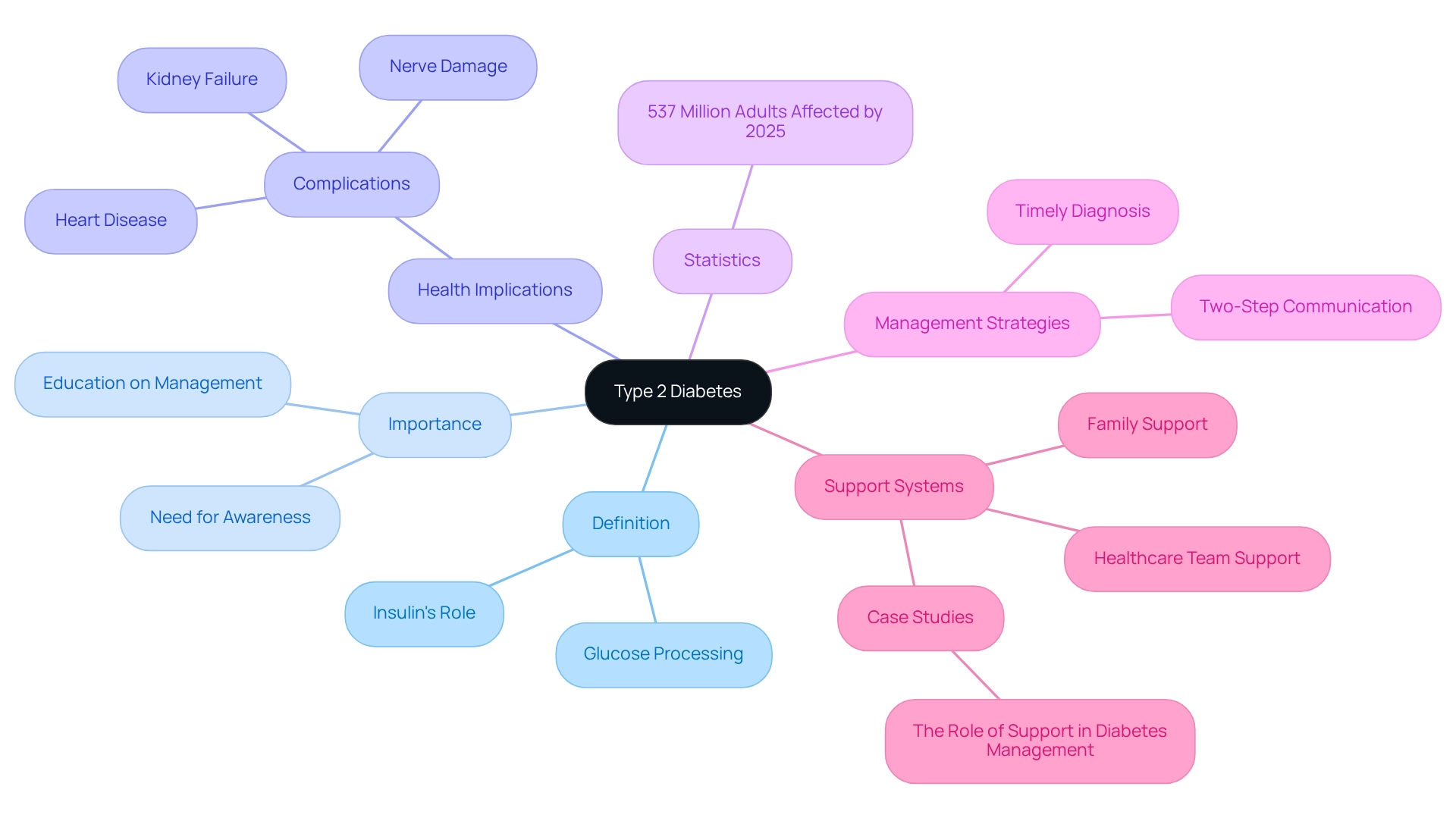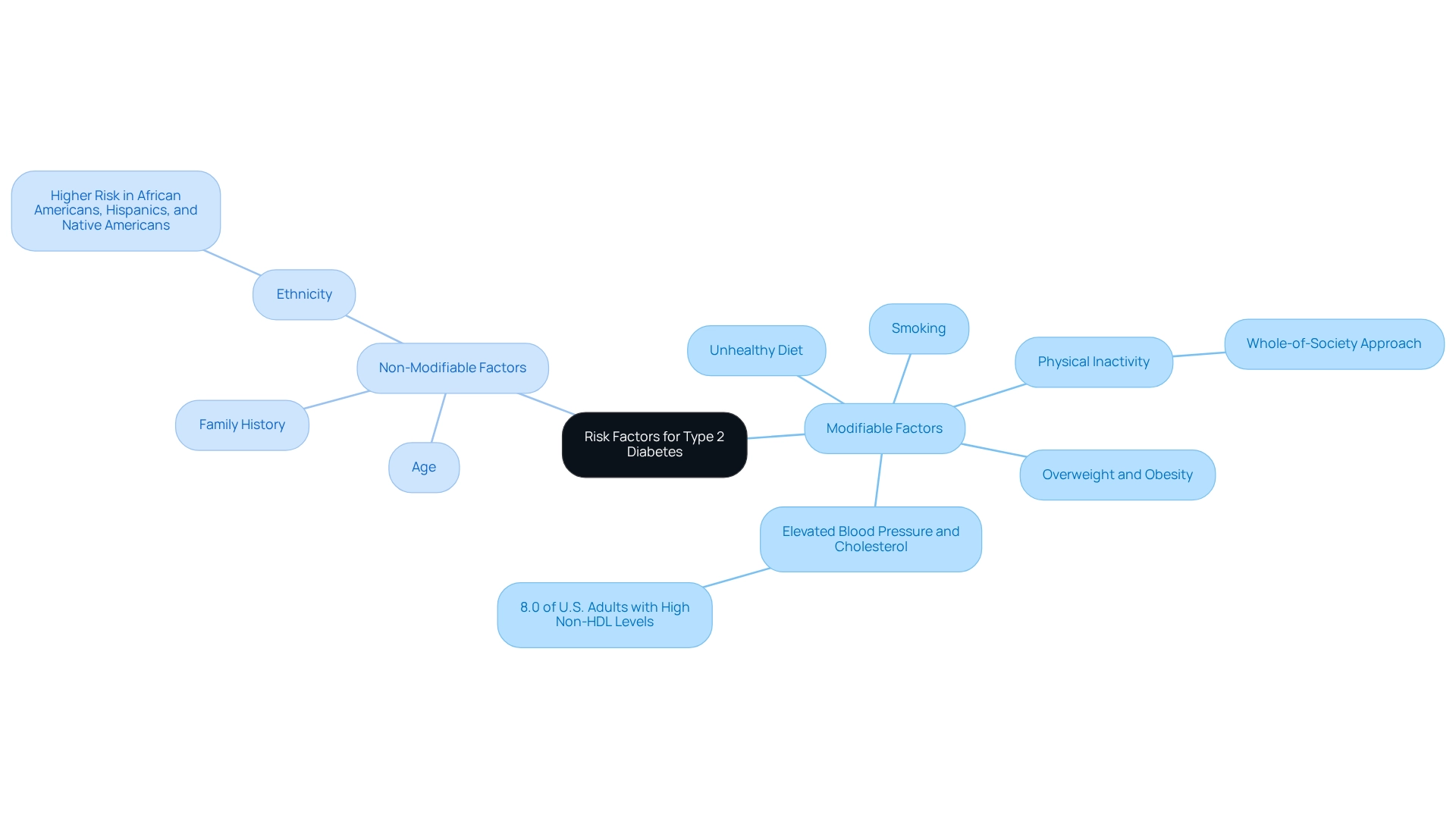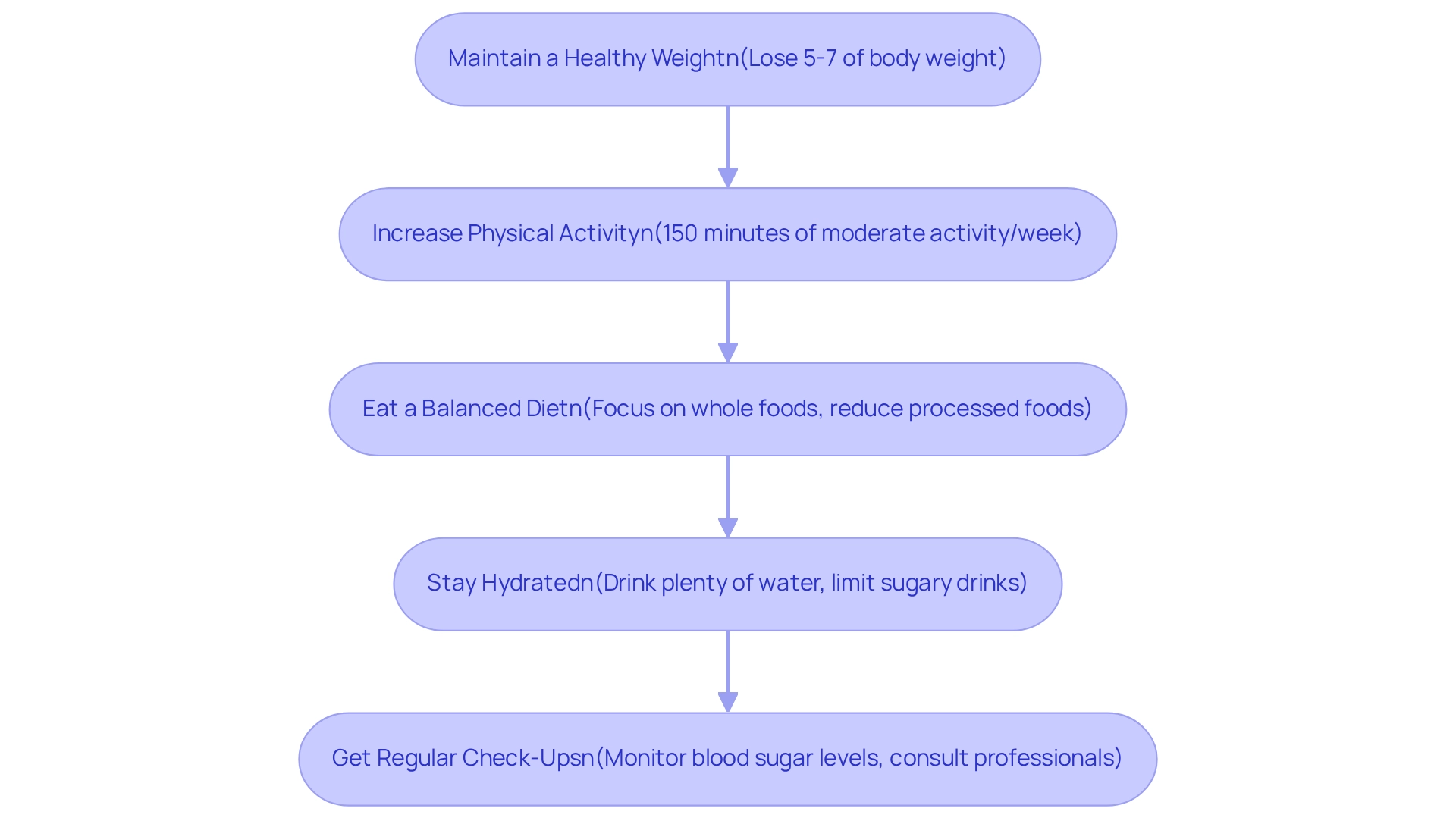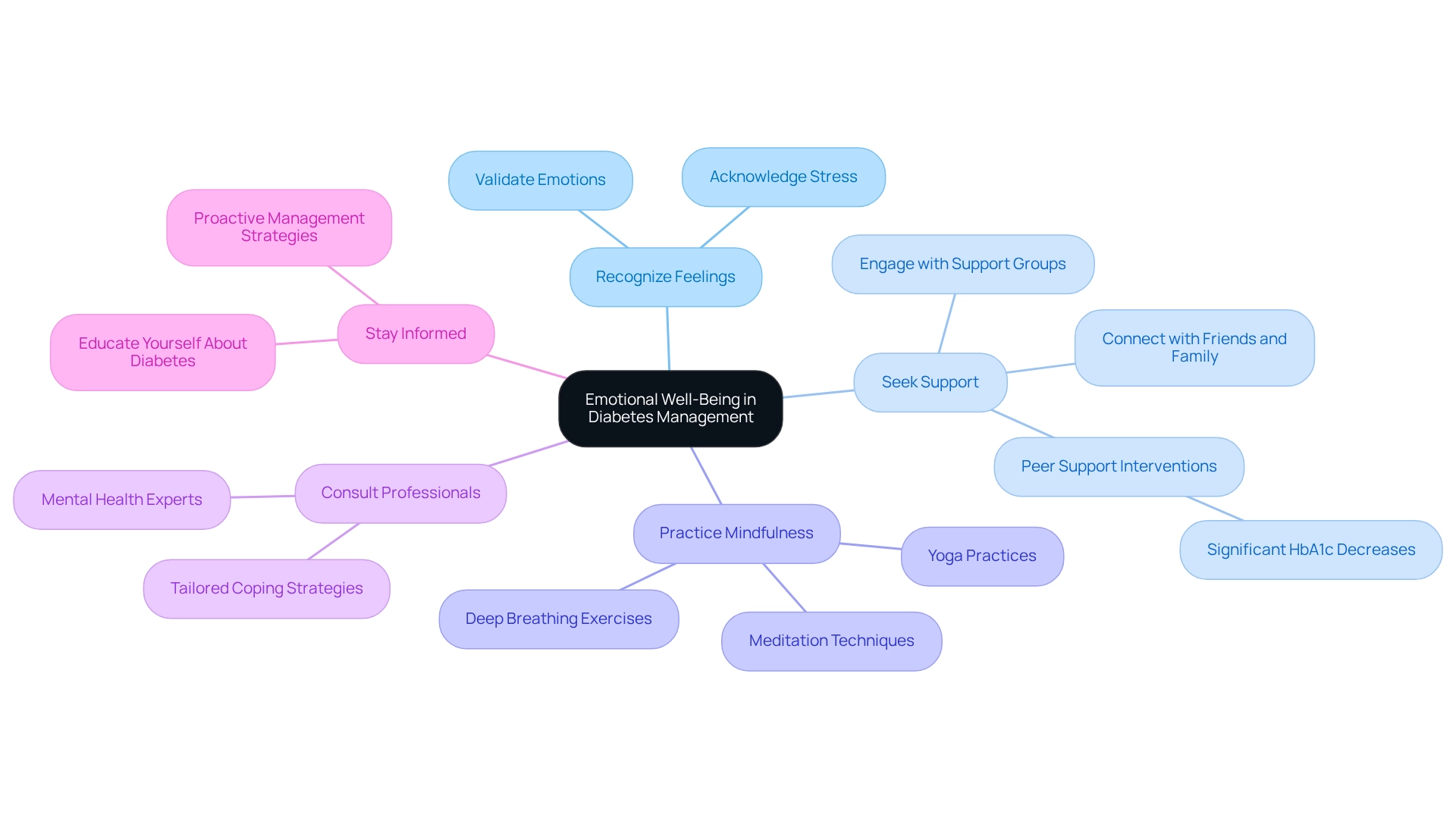Overview
This article aims to help you understand the risk factors for Type 2 diabetes and the lifestyle changes that can significantly reduce these risks. It's important to recognize that both modifiable factors, such as obesity and physical inactivity, and non-modifiable factors like age and family history, play crucial roles in your vulnerability to this disease. Understanding these factors can be overwhelming, but you are not alone in this journey.
To empower you, we outline actionable strategies that can make a difference in your life. Maintaining a healthy weight and increasing physical activity are vital steps you can take to lower your chances of developing Type 2 diabetes. Remember, every small change counts, and we are here to support you every step of the way.
It's understandable to feel uncertain about where to start, but know that these changes are within reach. By focusing on what you can control, you can take proactive steps toward a healthier future. Together, we can navigate this path with compassion and understanding.
Introduction
In a world that increasingly values health, the rise of Type 2 Diabetes serves as a poignant reminder of the struggles many face in caring for their well-being. This chronic condition disrupts the body’s ability to process glucose and can lead to serious health complications if not managed properly.
With approximately 537 million adults affected worldwide, it’s crucial to understand the complexities of Type 2 Diabetes—from its risk factors to the emotional challenges it brings. As you navigate your health journey, remember that:
- Education
- Lifestyle adjustments
- Emotional support
are vital in combating this widespread disease. This article explores the essential aspects of Type 2 Diabetes, aiming to equip you with the knowledge and strategies you need to take charge of your health. You're not alone in this journey; we are here to support you every step of the way.
Define Type 2 Diabetes and Its Importance
Type 2 is a long-term condition that affects your body’s ability to process sugar (glucose), which is essential for your cells' energy. In this condition, the body may either resist insulin—a hormone that helps sugar enter cells—or not produce enough insulin to keep glucose levels normal. This can lead to elevated blood sugar levels, which, if not managed properly, can result in serious health complications.
Understanding Type 2 is crucial, as it represents one of the most common forms of this condition worldwide. Current estimates suggest that around 537 million adults are living with it globally in 2025, and this number is expected to rise significantly. This highlights the urgent need for awareness and education.
Timely diagnosis and effective management are vital in reducing the risk of diabetes type 2 and its associated complications, such as heart disease, kidney failure, and nerve damage. A recent study emphasizes that improving care for individuals with diabetes is essential for better patient outcomes. It highlights the importance of a two-step communication method during diagnosis to help lessen emotional distress.
Real-world examples illustrate the impact of Type 2 on health complications, reinforcing the need for newly diagnosed patients to grasp the implications of their condition. As one healthcare professional shared, "I didn’t even know what the insulin was supposed to do for you. But, I mean, I didn’t even know." This quote underscores the critical need for education about insulin's role in managing diabetes-related issues. Furthermore, case studies reveal that while support from family and healthcare teams is vital, the ultimate responsibility for self-management rests with the patients themselves. One such case study, titled 'The Role of Support in Managing Diabetes,' highlights the importance of support systems in effectively navigating this condition.
T2DSolutions aims to be a comprehensive resource center for individuals managing Type 2. By providing educational resources, community support, and access to medical professionals, T2DSolutions empowers newly diagnosed patients to better understand their condition and take proactive steps in their wellness journey.
In summary, grasping the definition and significance of Type 2 is essential for newly diagnosed individuals. It enables you to take proactive steps in your health journey. Remember, you're not alone in this journey; we are here to support you every step of the way.

Identify Risk Factors: Modifiable and Non-Modifiable
Risk factors for Type 2 Diabetes can be grouped into modifiable and non-modifiable factors. Understanding these factors is essential for evaluating personal vulnerability and taking preventive measures.
Changeable risk factors include:
- Overweight and Obesity: Excess body fat, especially around the abdomen, can increase insulin resistance.
- Physical Inactivity: A sedentary lifestyle contributes to weight gain and insulin resistance. Dr. Fiona Bull emphasizes that promoting physical activity requires a whole-of-society approach to create environments that encourage active lifestyles.
- Unhealthy Diet: Diets rich in processed foods, sugars, and unhealthy fats can elevate your risk.
- Smoking: Tobacco use is linked to insulin resistance.
- Elevated Blood Pressure and Cholesterol: These conditions can heighten the likelihood of developing blood sugar issues. Notably, 8.0% of U.S. adults diagnosed with blood sugar issues had a non-HDL cholesterol level of 190 mg/dL or greater, underscoring the importance of monitoring cholesterol levels as a modifiable factor.
Non-modifiable risk factors include:
- Age: The risk increases with age, particularly after 45.
- Family History: A family history of diabetes raises your likelihood.
- Ethnicity: Certain ethnic groups, including African Americans, Hispanics, and Native Americans, have a higher likelihood.
For example, information from the SEARCH for Diabetes in Youth study reveals a significant rise in Type 2 health issues among children and adolescents, particularly in non-Hispanic Black and Asian or Pacific Islander groups from 2002 to 2018. This trend emphasizes the urgent need for effective prevention programs targeting youth, as identifying and managing these modifiable risk factors can help lower the risk of Type 2 diabetes. Remember, you're not alone in this journey, and there are resources available to support you every step of the way.

Implement Lifestyle Changes to Reduce Risk
To effectively decrease the risk of Type 2 diabetes, consider implementing the following lifestyle changes:
-
Maintain a Healthy Weight: Losing just 5-7% of your body weight can significantly reduce your chances of developing Type 2 Diabetes. Research shows that weight loss is directly linked to a lower risk of blood sugar issues, making it an essential first step.
-
Increase Physical Activity: Aim for at least 150 minutes of moderate aerobic activity each week, such as brisk walking or cycling. Incorporating activity breaks throughout your day can also be beneficial. For example, interrupting prolonged sitting has been shown to decrease postprandial glucose levels by approximately 14 mmol/h/L.
-
Eat a Balanced Diet: Focus on whole foods, including a variety of fruits, vegetables, whole grains, and lean proteins. Nutritionists highlight the importance of a balanced diet in preventing diabetes-related issues. They suggest reducing processed foods, sugars, and saturated fats to maintain stable blood sugar levels.
-
Stay Hydrated: Drinking plenty of water is essential. Limiting sugary drinks can help control calorie intake and decrease the likelihood of weight gain, which plays a significant role in health issues.
-
Get Regular Check-Ups: Consistent monitoring of blood sugar levels and discussions with medical professionals are vital for assessing your vulnerability and managing your health effectively. Being aware of your wellness condition allows you to make necessary changes to your lifestyle, which can help lower the risk of Type 2 diabetes while also enhancing overall fitness and well-being. Engaging in enjoyable physical activities, such as gardening, can promote a healthier lifestyle. You're not alone in this journey; by adopting these strategies, you can take proactive steps toward reducing the risk of Type 2 diabetes. Remember, we are here to support you every step of the way.

Address Emotional Well-Being in Diabetes Management
Handling this condition can be emotionally challenging, making it crucial to prioritize your emotional well-being for effective management. Here are several strategies to consider:
-
Recognize Feelings: It's important to acknowledge and validate feelings of stress, anxiety, or depression that may arise from the challenges of managing this condition. Understanding these emotions is the first step toward addressing them.
-
Seek Support: Engaging with support groups, friends, or family members who understand the unique challenges of managing this condition can provide a vital network of encouragement. Research shows that peer support interventions can lead to significant decreases in HbA1c levels, highlighting the importance of community in managing the risk of diabetes type 2.
-
Practice Mindfulness: Techniques such as meditation, yoga, and deep breathing exercises can effectively reduce stress and improve emotional well-being. These practices help cultivate a sense of calm and resilience in the face of diabetes-related challenges.
-
Consult Professionals: If emotional issues related to blood sugar management become overwhelming, seeking help from mental health experts is crucial. Their expertise can provide tailored strategies for coping with stress and anxiety.
-
Stay Informed: Educating yourself about the condition not only empowers you but also alleviates feelings of helplessness. Understanding the condition promotes a proactive strategy for management.
Recent discoveries stress the necessity for cohesive support systems in managing blood sugar issues, showcasing that emotional health is an essential aspect of effective management. Addressing emotional challenges can lead to improved health outcomes, as evidenced by case studies revealing that barriers to self-management often stem from emotional and physical struggles. By prioritizing your emotional well-being, you can enhance your ability to manage diabetes effectively and lower the risk of diabetes type 2, thereby improving your overall quality of life. Remember, you're not alone in this journey; we are here to support you every step of the way.

Conclusion
Understanding Type 2 Diabetes is essential for anyone affected by this chronic condition, as it empowers individuals to take control of their health. This article highlights the significance of education in recognizing the complexities of diabetes management, including the importance of early diagnosis, lifestyle modifications, and emotional support. With approximately 537 million adults living with Type 2 Diabetes, the urgency for awareness and proactive measures cannot be overstated.
Recognizing both modifiable and non-modifiable risk factors lays the groundwork for effective prevention strategies. By addressing lifestyle changes such as maintaining a healthy weight, increasing physical activity, and adopting a balanced diet, individuals can significantly reduce their risk of developing this condition. Furthermore, prioritizing emotional well-being through support systems, mindfulness practices, and professional guidance is crucial for managing the emotional challenges that often accompany diabetes.
In conclusion, taking charge of one's health in the face of Type 2 Diabetes requires a multifaceted approach. By combining education, lifestyle changes, and emotional support, individuals can navigate their health journey with confidence and resilience. Remember, you're not alone in this journey. The path to better health starts with informed choices and a commitment to self-care, ensuring a brighter future for those affected by this prevalent condition.
Frequently Asked Questions
What is Type 2 diabetes?
Type 2 diabetes is a long-term condition that affects the body's ability to process sugar (glucose), which is essential for energy in cells. It occurs when the body either resists insulin or does not produce enough insulin, leading to elevated blood sugar levels.
How common is Type 2 diabetes?
Type 2 diabetes is one of the most common forms of diabetes worldwide, with around 537 million adults estimated to be living with it globally in 2025. This number is expected to rise significantly.
Why is understanding Type 2 diabetes important?
Understanding Type 2 diabetes is crucial for timely diagnosis and effective management, which can reduce the risk of serious health complications such as heart disease, kidney failure, and nerve damage.
What role does education play in managing Type 2 diabetes?
Education about insulin and its role in managing diabetes is essential for newly diagnosed patients. It helps them understand their condition and take proactive steps in their health journey.
What are some complications associated with Type 2 diabetes?
Complications associated with Type 2 diabetes include heart disease, kidney failure, and nerve damage.
How can support systems aid in managing Type 2 diabetes?
Support from family and healthcare teams is vital for effectively navigating Type 2 diabetes, but the ultimate responsibility for self-management rests with the patients themselves.
What resources does T2DSolutions provide for individuals managing Type 2 diabetes?
T2DSolutions offers educational resources, community support, and access to medical professionals to empower newly diagnosed patients in understanding their condition and taking proactive steps in their wellness journey.



